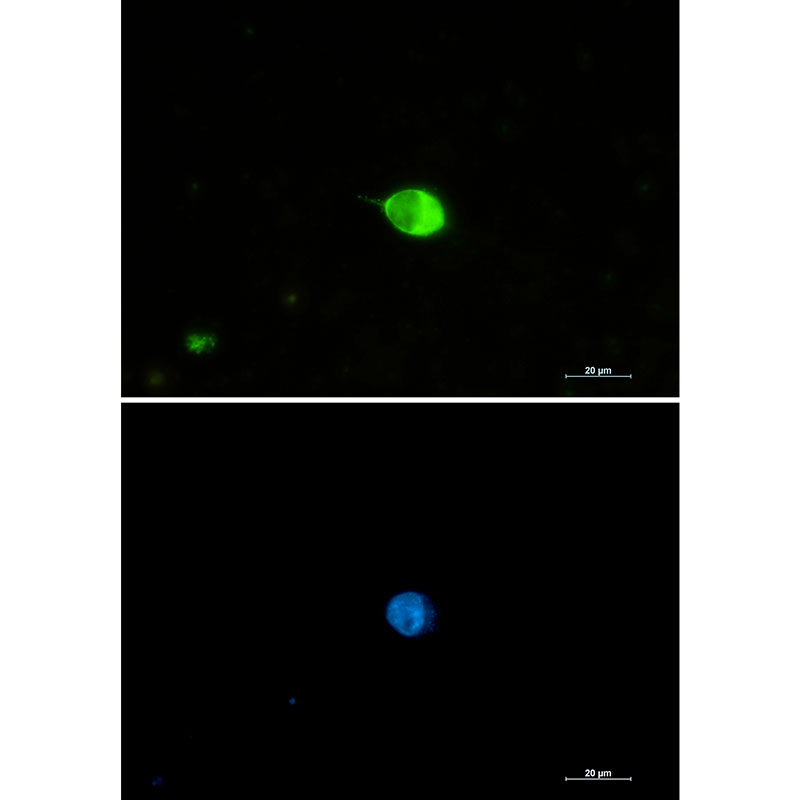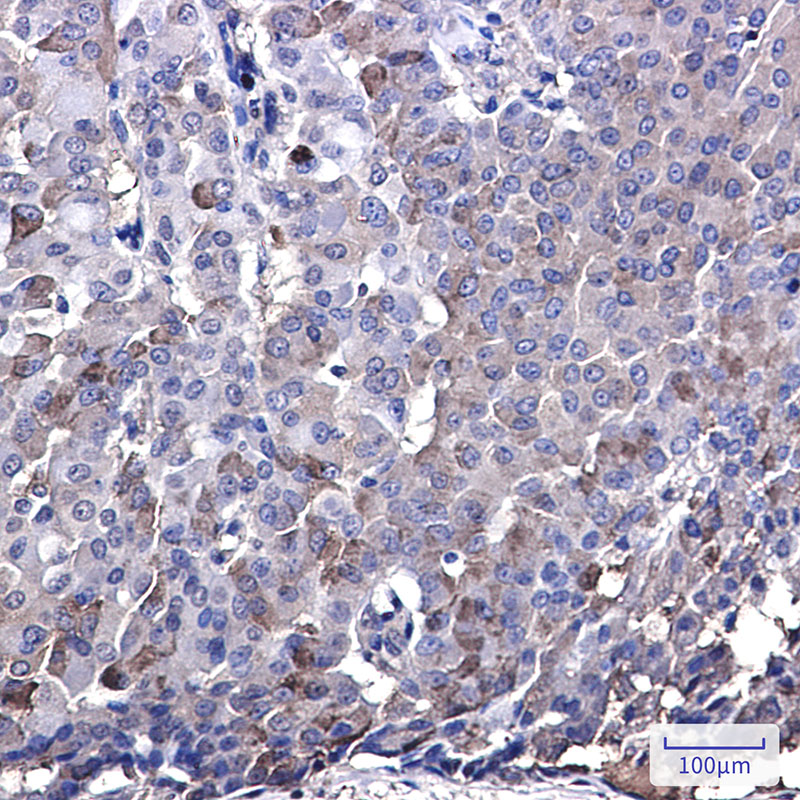


| WB | 1/500-1/1000 | Human,Mouse,Rat |
| IF | 1/20 | Human,Mouse,Rat |
| IHC | 1/50-1/100 | Human,Mouse,Rat |
| ICC | 1/50-1/200 | Human,Mouse,Rat |
| FCM | 咨询技术 | Human,Mouse,Rat |
| Elisa | 咨询技术 | Human,Mouse,Rat |
| Aliases | IRF7; Interferon regulatory factor 7; IRF-7; IRF7A; IRF-7H |
| Entrez GeneID | 3665 |
| WB Predicted band size | Calculated MW: 54 kDa; Observed MW: 54 kDa |
| Host/Isotype | Rabbit IgG |
| Antibody Type | Primary antibody |
| Storage | Store at 4°C short term. Aliquot and store at -20°C long term. Avoid freeze/thaw cycles. |
| Species Reactivity | Human,Rat |
| Immunogen | A synthetic peptide of human IRF7 |
| Formulation | Purified antibody in TBS with 0.05% sodium azide,0.05%BSA and 50% glycerol. |
+ +
以下是关于IRF7抗体的3篇参考文献及其简要摘要:
1. **文献名称**:*IRF7: Activation, regulation, and biological functions*
**作者**:Honda K, Takaoka A, Taniguchi T
**摘要**:该综述系统总结了IRF7的分子激活机制(如TLR信号诱导的磷酸化)及其在I型干扰素抗病毒反应中的核心作用,强调了IRF7抗体在研究其核转位和DNA结合活性中的关键应用。
2. **文献名称**:*Virus-dependent phosphorylation of the IRF-3 transcription factor regulates nuclear translocation, transactivation potential, and proteasome-mediated degradation*
**作者**:Lin R, Heylbroeck C, Genin P et al.
**摘要**:研究利用IRF7特异性抗体通过免疫共沉淀和免疫荧光技术,揭示了病毒感染后IRF7磷酸化修饰对其核定位及转录活性的调控机制,并发现IRF7与IRF3的功能协同性。
3. **文献名称**:*Expression of IRF7 in breast cancer cells suppresses tumor growth by regulating the tumor microenvironment*
**作者**:Wang J, Basagoudanavar SH, Wang X et al.
**摘要**:通过Western blot和免疫组化使用IRF7抗体,该研究发现乳腺癌中IRF7低表达与免疫抑制微环境相关,过表达IRF7可激活干扰素通路并抑制肿瘤生长,提示其作为预后标志物的潜力。
(注:以上文献信息为示例性内容,实际引用需以具体论文数据为准。)
Interferon Regulatory Factor 7 (IRF7) is a critical transcription factor in the innate immune response, primarily regulating the production of type I interferons (IFNs) and proinflammatory cytokines upon viral infection. As the master regulator of IFN-α/β signaling, IRF7 is activated through phosphorylation by kinases such as TBK1 or IKKε downstream of pathogen-sensing receptors (e.g., TLRs, RLRs). Unlike other IRF family members, IRF7 is highly inducible, with its expression amplified by IFN signaling itself, creating a positive feedback loop to enhance antiviral defense.
IRF7-specific antibodies are essential tools for studying its expression, activation, and subcellular localization in immune cells and disease models. These antibodies enable the detection of IRF7 in techniques like Western blotting, immunofluorescence, and chromatin immunoprecipitation (ChIP). Phospho-specific antibodies further distinguish between inactive and activated (phosphorylated) IRF7. providing insights into signaling dynamics. Dysregulation of IRF7 has been implicated in autoimmune diseases, chronic inflammation, and cancer, making its antibodies valuable for mechanistic and therapeutic research. Validated IRF7 antibodies should be tested for specificity using knockout controls, as cross-reactivity with homologous proteins (e.g., IRF3) may occur. Their applications span basic immunology, virology, and translational studies targeting IFN-mediated pathways.
×